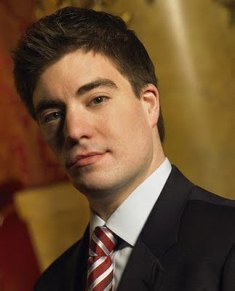
Maniaci Glorifies Handel and More

Michael Maniaci
|
Talk about lemons and lemonade.
When Michael Maniaci’s vocal chords failed to lengthen at puberty, he did not give up his dream of singing.
Instead, he became the exponent of a lost art, singing the mostly extinct repertoire for male soprano. In doing so, he has become one of the brightest stars in the opera world.
Maniaci, a graduate of the University of Cincinnati College-Conservatory of Music, who recently moved back to Cincinnati, performed a delectable program for the early music ensemble Catacoustic Consort Friday night at the Church of the Advent in Walnut Hills. Presented in collaboration with the Constella Festival of Music and Fine Arts, it was a genuine event.
Maniaci, 35, does not sing falsetto like the more familiar countertenor. He sings with a full chest voice over a two-octave range from middle C to high C. But that is not all. He is a consummate musician, who achieves the highest musical expression through dynamics, tone color, ornamentation, phrasing and dramatic effect.
Performing with him were William Averill on harpsichord, Jennifer Roig-Francoli on baroque violin and James Lambert and Annalisa Pappano on lirone and viola da gamba.
The program was a mixture of songs and arias from sacred works and opera, beginning with a delightful set of songs by British composer Henry Purcell (1659-95), including “Fairest Isle” (form his proto-opera “King Arthur”) and the charming “Dear Pretty Youth.” Maniaci demonstrated how he can put it "all together" in a complete stylistic rendition with four songs by Giulio Caccini (1551-1618). All dealt with disappointed or spurned love. He applied the wide range of baroque ornamentation with seeming ease and proficiency (including affective vibrato) and reflected the meaning of the Italian texts to sometimes comic effect. (Note his look of chagrin on possanza at the end of Con le luci d’un bel ciglio (“With the lights of her lovely brow”) where the lyricist asserts his inability to overcome a “pitiless beauty”).
Roig-Francoli joined Maniaci and Averill in the great aria Erbarme Dich (“Have mercy Lord”) from Bach’s “St. Matthew Passion.” Few more poignant lines have ever been penned, and it was a privilege to hear them performed by this ensemble. Maniaci conveyed the devotional text with serene beauty, while Roig-Fancoli showed herself a superb baroque violinist, with a pure, clean tone, precise bowing and selective vibrato. Lambert (double bassist in the Cincinati Symphony as well as a nimble gambist) joined them In “Laudamus te” from Bach’s Mass in B Minor, where Maniaci’s smooth coloratura and pinpoint trills were but a hint of what the audience would hear after intermission.
The second
half opened with a lovely instrumental selection by Antonio Bertali (1605-1669)
performed by Roig-Francoli, Lambert and Averill
(Sonata à 2 for Violin, Viola da gamba and Continuo). This was proof positive,
as was the whole concert, that early music is alive and well in Cincinnati.
Maniaci returned for Monteverdi’s Voglio di vita uscir (“I want to depart life”) from Book One of his Madrigals with liironist Pappano and Averill. This florid gem from the early baroque master was gorgeously realized – with a snarl at the end, as Maniaci expressed the sarcasm of the text (“if in loving you, I offended, henceforth pardon me”).
It was pure
Handel to the end, a potpourri of the baroque master’s operatic works, given formidable
interpretation by Maniaci, Lambert, Averill and Roig-Francoli. Heard were: Agitato da fiere tempeste (from “Oreste”),
Che bel contento (“Flavio”), Cara speme (“Giulio Cesare”), Se potessero (“Imeneo”) and Ombra mai fu (“Xerxes”). Needless to say, one would have to travel far
and wide (perhaps forever) to hear anything the equal of this. This is pre-oratorio Handel, who could not
make a success of Italian opera when he moved to England (hence “Messiah” and
the other masterpieces by which he is best known today). Maniaci filled them with tenderness, humor,
disgust (Che bel contento where the text speaks of jealousy and “my joy
changing to poison”), sorrow, hope and all the emotions so well reflected in
baroque opera. Nothing could have been
more beautiful than Ombra mai fu (“Never
was there a tree”) from “Xerxes,” also known as Handel’s Largo, the loveliest ode to a tree ever written, performed with violinist Roig-Francoli.
A standing ovation, cheers and shouts compelled Maniaci to repeat Caccini’s “Amarilli” as an encore. With this amazingly gifted singer now resident in Cincinnati, one hopes that, given his busy international schedule, we may hear more from him, both with Catacoustic and on the opera stage.